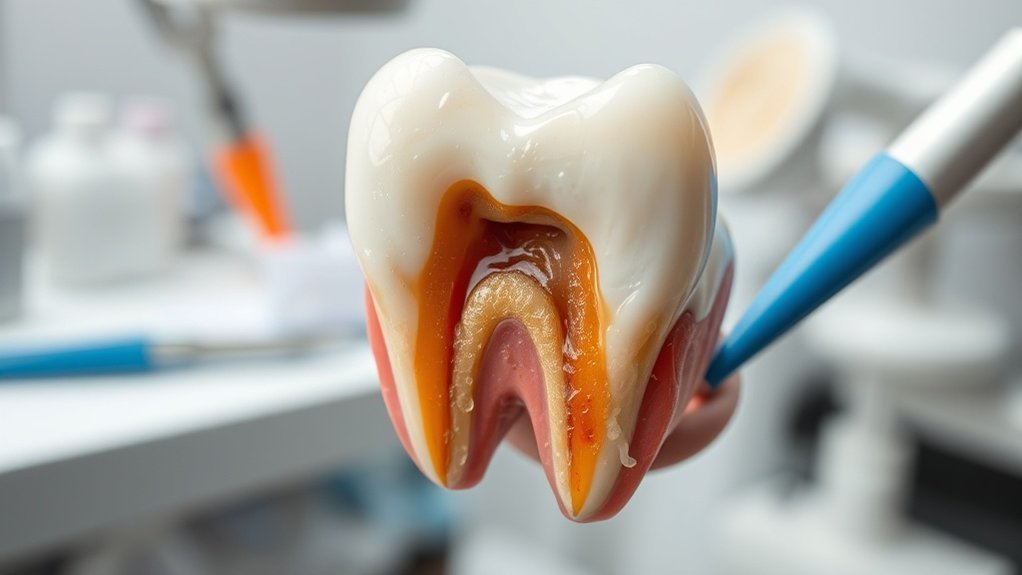Systemic Diseases Worsen Oral Microbial Imbalance and Dental Health
Systemic diseases can greatly worsen your oral microbial balance, leading to serious dental health issues. Conditions like diabetes increase inflammation and oral bacteria imbalance, raising your risk for gum disease and tooth decay. In turn, periodontal disease can exacerbate systemic issues, creating a vicious cycle. Maintaining good oral hygiene is essential for mitigating these risks, as poor dental care can worsen your overall health. Discover how to effectively maintain oral health alongside systemic conditions to prevent such challenges.
Key Takeaways
- Systemic diseases like diabetes and cardiovascular conditions can increase inflammation, disrupting oral microbial balance and worsening dental health.
- Poor oral health can exacerbate systemic diseases, creating a vicious cycle of inflammation and bacteria entering the bloodstream.
- Autoimmune disorders alter immune responses, heightening the risk of infections and leading to further oral microbial imbalance.
- Regular dental care and good oral hygiene are crucial for preventing the negative impact of systemic diseases on oral health.
- Collaboration between dental and healthcare providers ensures integrated care, addressing both oral and systemic health needs effectively.
Understanding Oral Microbial Imbalance
How does the balance of microorganisms in your mouth influence overall health? An oral microbial imbalance can lead to significant dental health issues, including cavities and periodontal disease. When harmful bacteria outnumber beneficial ones, inflammation occurs, creating a pathway for systemic diseases. Research shows that oral bacteria can enter the bloodstream, contributing to conditions like heart disease and diabetes. Maintaining a healthy balance of oral microorganisms is essential for preventing these complications. Factors such as poor oral hygiene, diet, and stress can disrupt this balance. By prioritizing dental health through regular check-ups, proper brushing, and a balanced diet, you can mitigate the risks associated with oral microbial imbalances and protect your overall health.
The Impact of Diabetes on Oral Health
While managing diabetes, it’s crucial to recognize how this condition can adversely affect your oral health. Elevated blood sugar levels can lead to chronic inflammation and an imbalance in oral microbiota, increasing the risk of gum disease and tooth decay. Research indicates that individuals with diabetes often experience dry mouth, which reduces saliva’s protective properties, allowing harmful bacteria to flourish. This imbalance can exacerbate periodontal disease, creating a vicious cycle where oral health deteriorates and blood sugar control worsens. Furthermore, chronic inflammation from gum disease can contribute to systemic complications, making it essential to maintain rigorous dental hygiene. Regular dental check-ups and proactive measures can help mitigate these risks, promoting better overall health while managing diabetes.
Cardiovascular Disease and Its Oral Connections
Understanding the connection between oral health and cardiovascular disease is vital for your overall well-being. Research shows that oral bacteria can enter your bloodstream, potentially leading to inflammation and gum disease, which may exacerbate heart conditions. By recognizing these links, you can take proactive steps to protect both your dental and cardiovascular health.
Oral-Bacterial Link Explained
Since oral bacteria can travel through the bloodstream, their connection to cardiovascular disease becomes increasingly significant. Studies show that bacteria like Porphyromonas gingivalis, commonly found in periodontal disease, can enter the bloodstream and promote atherosclerosis. When these pathogens invade, they can trigger inflammation and contribute to plaque buildup in arteries. This process creates a cycle where poor oral health exacerbates cardiovascular issues. Additionally, the presence of systemic inflammation can further destabilize existing cardiovascular conditions, leading to increased risks of heart attacks or strokes. By maintaining oral hygiene, you’re not just protecting your teeth and gums; you’re actively reducing your risk of cardiovascular disease. Understanding this link emphasizes the importance of all-encompassing healthcare that includes oral health as a critical component.
Inflammation and Gum Disease
When inflammation occurs in the body, it can greatly impact your gum health, creating a direct link to cardiovascular disease. Chronic inflammation, often stemming from periodontal disease, can lead to increased levels of inflammatory markers in your bloodstream. This condition not only affects the gums but also elevates your risk for heart-related issues. Research suggests that the bacteria from gum disease can enter your bloodstream, potentially causing atherosclerosis—hardening of the arteries. Additionally, the inflammatory response triggered by gum disease can exacerbate existing cardiovascular conditions. By maintaining good oral hygiene and addressing any gum issues promptly, you can help mitigate these risks, emphasizing the importance of oral health in maintaining overall cardiovascular well-being.
Heart Health Implications
While many people may not realize it, the health of your gums can greatly influence your heart health. Research shows that periodontal disease is linked to cardiovascular disease, as inflammation from gum infections can enter your bloodstream and contribute to arterial plaque buildup. Bacteria from gum disease can also trigger systemic inflammation, which is a risk factor for heart conditions. Additionally, individuals with poor oral health may experience elevated levels of C-reactive protein, a marker associated with increased cardiovascular risk. Maintaining good oral hygiene—brushing, flossing, and regular dental check-ups—can help reduce inflammation and lower your risk of heart disease. By prioritizing your dental health, you’re also taking an essential step toward better heart health.
Autoimmune Disorders: A Double-Edged Sword
Autoimmune disorders can greatly impact your oral health by altering your immune response, leading to increased susceptibility to infections. As your immune system struggles to differentiate between healthy cells and pathogens, bacterial overgrowth can occur, resulting in inflammation and potential periodontal disease. Understanding this dual effect is essential for managing both your systemic health and dental care.
Immune Response and Oral Health
Understanding the complex interplay between immune responses and oral health reveals how autoimmune disorders can act as a double-edged sword. On one hand, these disorders can lead to heightened inflammation, compromising your oral health by disrupting the balance of beneficial and harmful bacteria in your mouth. For instance, conditions like rheumatoid arthritis and lupus can exacerbate periodontal disease, resulting in tissue damage and tooth loss. On the other hand, the immune response activated during these disorders might help in controlling certain oral infections. However, the long-term effects often outweigh the benefits, as chronic inflammation can perpetuate a cycle of oral health deterioration. Consequently, managing autoimmune disorders is essential for maintaining ideal oral health and preventing further complications.
Bacterial Overgrowth and Inflammation
Chronic inflammation resulting from autoimmune disorders often creates an environment ripe for bacterial overgrowth in the oral cavity. This overgrowth can disrupt the delicate balance of oral microbiota, leading to dysbiosis. For instance, studies show that increased levels of pro-inflammatory cytokines can promote the proliferation of pathogenic bacteria while suppressing beneficial species. When this imbalance occurs, you’re more susceptible to periodontal disease, further exacerbating inflammation and potentially impacting systemic health. Additionally, the presence of certain bacteria associated with autoimmune conditions may trigger immune responses, creating a vicious cycle. By addressing oral health proactively, you can manage bacterial overgrowth and reduce inflammation, ultimately supporting both your dental health and overall well-being.
The Role of Oral Hygiene in Systemic Health
While many people view oral hygiene as simply a matter of maintaining a bright smile, its impact on systemic health is profound and far-reaching. Poor oral hygiene can lead to periodontal disease, which has been linked to conditions such as heart disease and diabetes. By practicing good oral hygiene, you not only protect your teeth but also support your overall health.
| Oral Hygiene Practice | Systemic Health Benefit | Evidence Source |
|---|---|---|
| Regular brushing | Reduces inflammation | Journal of Periodontology |
| Daily flossing | Lowers cardiovascular risk | American Heart Association |
| Routine dental visits | Early disease detection | CDC |
| Antimicrobial rinses | Prevents bacterial spread | Journal of Clinical Dentistry |
Investing in your oral care is investing in your systemic well-being.
Preventing Dental Issues in Patients With Systemic Diseases
Patients with systemic diseases face unique challenges when it comes to dental health, as their conditions can exacerbate oral issues and vice versa. To prevent dental problems, it’s vital to maintain rigorous oral hygiene practices, including regular brushing and flossing. You should schedule frequent dental check-ups to monitor any changes in oral health. Additionally, a balanced diet rich in vitamins and minerals can support both oral and overall health. Staying hydrated is important, as dry mouth is common among patients with systemic conditions. Collaborating with healthcare providers guarantees that your dental care aligns with your medical needs, particularly if medications may impact oral health. By taking these proactive steps, you can greatly reduce the risk of developing dental complications.
The Vicious Cycle of Disease and Oral Health
Understanding the interplay between systemic diseases and oral health reveals a troubling vicious cycle that can greatly impact overall well-being. When you experience a systemic disease, like diabetes or heart disease, inflammation rises, often exacerbating oral health issues such as gum disease and tooth decay. This poor oral health, in turn, can worsen your systemic condition by increasing inflammation and bacteria in the bloodstream. Research indicates that individuals with periodontal disease face higher risks of cardiovascular events. Consequently, neglecting oral health can lead to a deterioration in your systemic condition, creating a feedback loop that’s difficult to break. Addressing one aspect without considering the other may leave you vulnerable to a decline in both oral and systemic health.
Strategies for Maintaining Oral Microbial Balance
To maintain a healthy oral microbial balance, you must adopt effective strategies that support both your dental and systemic health. Start by brushing twice daily with fluoride toothpaste and flossing regularly to remove plaque and food particles. Incorporating a balanced diet rich in fruits, vegetables, and probiotics can enhance beneficial bacteria in your mouth. Limiting sugar intake is essential, as high sugar levels promote harmful microbial growth. Staying hydrated helps maintain saliva flow, which is important for neutralizing acids and washing away debris. Regular dental check-ups allow for early detection of issues that could disrupt microbial balance. Additionally, managing stress and avoiding tobacco products can greatly improve your overall oral health, fostering a stable microbial environment essential for disease prevention.
Frequently Asked Questions
Can Certain Medications Affect Oral Microbial Balance?
Yes, certain medications can disrupt your oral microbial balance. Antibiotics, for instance, reduce beneficial bacteria, leading to overgrowth of harmful microbes. Regular dental check-ups and maintaining oral hygiene can help mitigate these effects.
How Does Stress Influence Oral Health and Microbial Imbalance?
When you’re under stress, it’s like a house of cards; everything can collapse. Stress disrupts your immune response, leading to increased inflammation and a higher risk of oral microbial imbalance, adversely affecting your overall dental health.
Are There Specific Diets That Help Maintain Oral Microbial Balance?
Yes, diets rich in fiber, antioxidants, and probiotics, like fruits, vegetables, and fermented foods, promote oral microbial balance. Reducing sugar intake also helps, as it limits harmful bacteria and supports overall dental health.
Is There a Connection Between Oral Health and Mental Health?
When it comes to oral health and mental health, they’re two sides of the same coin. Research shows poor oral health can lead to increased stress and anxiety, impacting your overall mental well-being considerably.
How Can Probiotics Benefit Oral Health in Systemic Disease Patients?
Probiotics can enhance oral health by restoring microbial balance, reducing inflammation, and inhibiting harmful bacteria. For systemic disease patients, these benefits may improve overall health and potentially alleviate some oral health-related complications.
Conclusion
In traversing the intricate relationship between systemic diseases and oral health, you’re confronted with a reality where each affects the other in a continuous cycle. Imagine the lurking bacteria in your mouth, waiting to exploit any vulnerability. By prioritizing oral hygiene and understanding these connections, you can disrupt this cycle. The question remains: will you take the necessary steps to protect not just your teeth, but your overall health? The choice you make today could shape your tomorrow.






